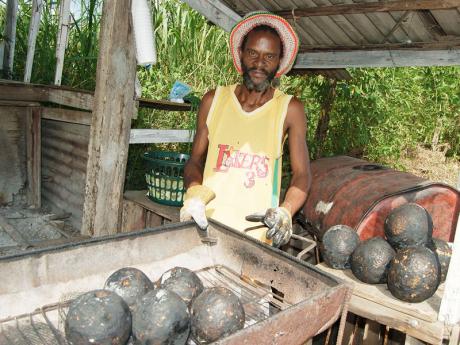BREADFRUIT - Jamaica fails to capitalise on high demand overseas - Ministry pushes for planting of more fruit trees
Christopher Serju, Gleaner Writer
Jamaica's roasted breadfruit is in high demand in Canada and Europe, however, like much of our other produce for which foreigners have developed a liking, the country is not able to fill the orders.
"I have lots of overseas orders for breadfruit. People want roasted breadfruit by the container load and we can't fill the orders. So we need large acreages (of these trees)," Locksley Waites, a fruit-tree coordinator with the Rural Agricultural Development Authority (RADA), told The Gleaner. But breadfruit is not the only local produce for which there is strong overseas demand.
"Four of the crops you need to zero in on now are soursop, breadfruit, guava, and nutmeg," Waites said, adding that the orders for soursop leaves are huge and would increase, as scientists around the world confirm the many health benefits of the plant, including its potential to cure diseases and enhance immunity.
Waites is hoping that more people will look to get into this venture, but advises that they should first ensure they have legal tenure to the land, as this is critical to being accepted by RADA to be part of an islandwide fruit-tree planting that it has started.
GETTING ON BOARD
He told The Gleaner: "We require that you own the land, or if it is family land, you get a letter from a family elder authorising you to use it. If it is leased land, we say you must have at least a 29-year lease, the reason being that most fruit trees mature at about year 10, so you don't want to lease it for 12 years and, by the time you start making money, the man run you.
"So for you to get the plant (from RADA), we'll have to select you and then, once we authorise you to prepare the place, we assist you to line out the place, offer guidance in terms of proper spacing, and we even show you how to dig the holes."
The plants are being given under a national fruit-tree crop project that the Ministry of Agriculture and Fisheries started in 2000, with RADA the implementing agency. It aims at establishing orchards on Crown land, private land, and other suitable open spaces in every parish. The fruits first selected were ackee, Otaheiti apple, avocado, breadfruit, cashew, guava, guinep, June plum, lychee, mango, naseberry, nutmeg, and soursop, with jack fruit and custard apple added later.
Some 14 years later, Waites is still excited about the potential economic benefits to be derived at the individual and national level, and wants to see much more fruit trees planted.
The objective is to first satisfy local demand for fresh fruits, with some going to the export market and the seasonal excess being channelled into cottage industries to make juices, jams and jellies. The project, however, has an environmental component as well, since it is anticipated that this islandwide 'fruitification' will also help in soil conservation while providing employment for people in rural Jamaica, particularly.
The initial response saw most participants opting to plant ackee, with some 70 per cent of the estimated 800,000 seedlings distributed being this crop. By 2007, then Agriculture Minister Dr Christopher Tufton sought to fine-tune the project by focusing on what were deemed to be the top six fruits - ackee, avocado, guava, breadfruit, June plum, and soursop - and to a lesser extent, lychee.

